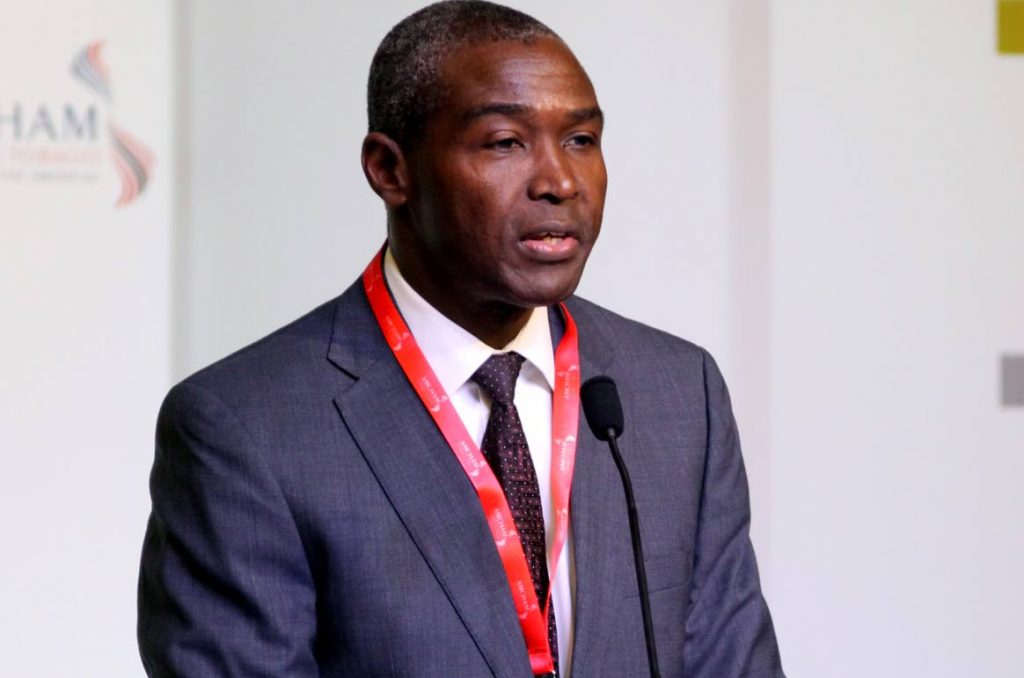Atlantic CEO: Engage with employees to solve 'impossible problems'

OUTGOING CEO of Atlantic Dr Philip Mshelbila says a major focal point of his job at the LNG producer is to engage with employees, solve problems, clear obstacles to maximise productivity.
On Wednesday, Mshelbila advised fellow leaders in commerce to challenge themselves in creating sustainable solutions for hindrances to the business's progress, when he spoke at the launch of the American Chamber of Commerce's (AmCham) 25th Health, Safety, Security and Environment (HSSE) Conference. The the actual conference will run from October 25-29, with Atlantic once again the title sponsor.
Mshelbila, who spent three years at Atlantic, will return to his parent company, Shell, after the transition takes effect on August 1. He will be replaced by new CEO Ronald Adams.
Mshelbila said leaders must change the way they view impossible problems before finding a solution.
"If you take the perspective that it is an 'impossible problem' just because the solution hasn't yet been found, then that gives you a completely different approach to tackling the problem.
"Whatever challenges or problems we face, whether as a person or as a business, there will be a solution somewhere, somehow. We may not get to it, either because we look at it in the wrong way or we don’t have the right tools and resources but there is a way to get around it."
Mshelbila's address followed feature speaker's Chris Clearfield presentation titled How to Solve Impossible Problems.
Mshelbila said while Clearfield's title is an oxymoron, he believes "nothing is truly impossible."
Solving impossible problems requires sustainable solutions, he said, otherwise time is wasted trying to resolve the same problem.
"You have to create a culture that enables you to sustain the model and it is in that culture that will allow you to evolve through different difficult times and times of change."
AmCham's HSSE Conference will again welcome local and international industry leaders and experts who are responsible for health and safety across various industries.
The event will explore the embracing of new trends and concepts which transition HSSE into a new era. It is themed Learn, Evolve, Thrive.
Melissa Pierre, AmCham's Senior Trade and Policy Specialist, said the theme is fitting as it speaks to the experience companies and citizens have faced during the pandemic, as well as AmCham's commitment to health and safety.
"Implementing new systems and processes, and enforcing new regulations may do well to reduce risk and prevent hazards or injuries," Pierre said, "but if the central focus of these new measures isn’t placed on people, then all we are doing is just creating more rules.
"What we are saying is that to make sure that we are always at the forefront of keeping our people safe, we have to constantly learn from our past mistakes, adapt to the new circumstances and be willing to evolve so that we are always preparing for a new normal even if that may be far away on the horizon. We must also create cultures of trust and collaboration."
Meanwhile, feature speaker at the launch, consultant and author Chris Clearfield gave practical methods to overcome hurdles.
Clearfield said companies seeking to solve "impossible problems" must ask real questions, celebrate resistance and run experiments, adding that those seeking to be an agent of change or influence must also engage people and "meet them where they are."
The opportunity, he said, is to use "authentic inquiry which is to really engage your people to understand the problem better.
"If you're engaging with people in an authentic way across an organisation, you are naturally going to be starting to build the muscle for teamwork and collaboration in a very different way and that is one of the muscles that is needed to solve these kinds of impossible problems."
Clearfield advised leaders to solve problems by "celebrating resistance," saying, "The process of dialogue or working with someone to develop ideas and having somebody not accept what you say is true, that is the creative process of generating better and better ideas."
He said leaders are much more effective with change when they can think in terms of experiments.
"It's not about coming up with some right answer and then changing your policy manual and pushing it throughout the organization. It's about experiments," Clearfield said.
"Instead of saying, 'what's the solution,' think about the question.
"What do we want to try next?" he suggested. "When you're able to do that, that's when you're able to not only move faster but also really create this opportunity to engage leaders and people at all different levels of the organization who are invested in the success of the experiment. If they see that successful experiment happening, then they will start to get interested."

Comments
"Atlantic CEO: Engage with employees to solve ‘impossible problems’"